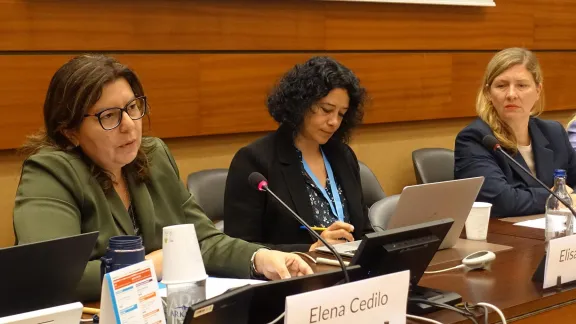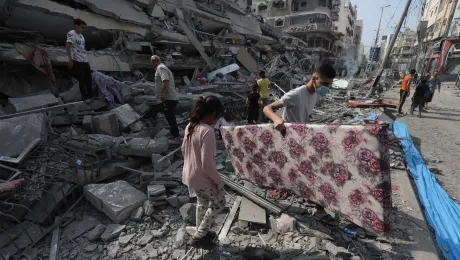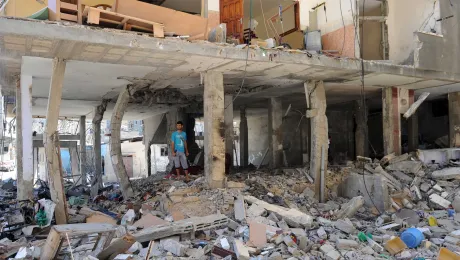
Elena Cedillo, LWF Program Executive for Climate Justice, on a panel together with Elisa Morgera, UN special rapporteur on Human Rights and Climate Change, speaking on “A Human Rights and Ethical Perspective on Non-economic Loss and Damage in the Context of Climate Change.” Photo: Private
Human Rights Council side event addresses the human rights impact of non-economic climate-related losses and damages
(LWI) – “Faith-based communities are on the front lines of climate change, witnessing firsthand the loss of culture, biodiversity, and mental wellbeing,” said Elena Cedillo, Program Executive for Climate Justice.
The Lutheran World Federation (LWF), as part of the Geneva Interfaith Forum on Climate Change, Environment, and Human Rights, co-hosted a side event at the 56th Session of the Human Rights Council in Geneva, Switzerland. The event was titled “A Human Rights and Ethical Perspective on Non-economic Loss and Damage in the Context of Climate Change.”
Cedillo was one of the panelists. “Our unique moral and ethical perspectives drive us to focus on raising awareness through education, campaigns, and advocacy, using powerful storytelling to humanize the impacts of non-economic loss and damage beyond what statistics and other data can convey,” she said.
The event, held on 1 July, focused on the intersection of human rights and the impacts of loss and damage due to climate change, highlighting the profound challenges vulnerable communities worldwide face. Panelists emphasized how non-economic losses – such as the loss of life, health, cultural heritage, flora and fauna – pose severe threats to the enjoyment of human rights and social wellbeing. Thus, they require remedial action.
Elisa Morgera, UN special rapporteur on Human Rights and Climate Change, echoed the need for a deeper understanding at the local level. She said connecting local insights to the international level is essential, and spaces for those voices must be created. Non-economic loss and damage could best be addressed and integrated into the global responses to climate change impacts when local perspectives shape them.
“As faith actors, we aim for holistic approaches that promote resilience and wellbeing through partnerships,” said Elena Cedillo. “Looking ahead at the next UN Climate Change Conference COP29 in Baku, Azerbaijan, we must ensure through our collaboration that climate policies are inclusive and just, emphasizing the protection of creation, care for the vulnerable, and upholding justice.”


